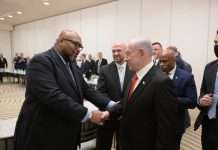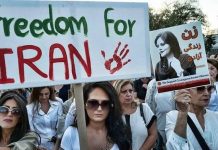How to put some teeth into the nuclear deal with Iran
By Dennis Ross and David H. Petraeus /Washington Institute/August 27/15
Dennis Ross, a fellow at the Washington Institute for Near East policy, was special assistant to President Obama for the Middle East and South Asia from 2009 to 2011. Gen. David H. Petraeus, who retired from the Army in 2011 after commanding U.S. and coalition forces in Iraq and Afghanistan, was director of the CIA from September 2011 to November 2012.
Many members of Congress continue to grapple with the nuclear deal with Iran — and so do we. Like us, the undecideds see its benefits: The deal would block the uranium enrichment, plutonium separation and covert paths to a nuclear bomb for the next 15 years. Compared with today, with an Iran that is three months from break-out capability and with a stockpile of 10 bombs’ worth of low-enriched uranium, there can be little doubt that a deal leaves us far better off , producing a one-year break-out time and permitting the Iranians less than one bomb’s worth of material for the next 15 years . We also don’t believe that if Congress blocks the deal, a better one is going to be negotiated. Will the other members of the P5+1 be ready to return to the table because Congress says no? Will they even know who defines the U.S. position and what it is? We doubt it.
So if the deal, known as the Joint Comprehensive Plan of Action (JCPOA), has clear benefits and there is no obvious negotiated alternative , why are we still undecided? Put simply, because the deal places no limits on how much the Iranians can build or expand their nuclear infrastructure after 15 years. Even the monitoring provisions that would continue beyond 15 years may prove insufficient as the Iranian nuclear program grows. And Iran’s ability to dramatically increase its output of enriched material after year 15 would be significant, as Iran deploys five advanced models of centrifuges starting in year 10 of the agreement.
In terms of the size of its nuclear program, Iran will be treated like Japan or the Netherlands — but Iran is not Japan or the Netherlands when it comes to its behavior. It is, after all, one of three countries designated by the United States as a state sponsor of terrorism. Perhaps in 15 years we will see a very different Iran — not a sponsor of terrorism, not a threat to its neighbors, not led by those who declare that Israel, another U.N.-member state, should be eliminated. But, while we hope that Iran may change, we cannot count on it.
The fact that President Obama emphasizes that the plan depends on verification — not trust — also means that he is not assuming Iran will change. But verification means only that we can catch the Iranians if they cheat; what matters even more is that the Iranians recognize that they will pay a meaningful price when we catch them.
In other words, deterrence is the key to ensuring not just that the Iranians live up to the agreement but also to preventing them from developing nuclear weapons. Iran must know that we will not permit it to become a nuclear weapons state ever.
Now is the time to make it clear that there will be a firewall between Iran’s threshold status and its having a nuclear weapon. Now is the time for the Iranians and the world to know that if Iran dashes toward a weapon , especially after year 15, that it will trigger the use of force. At that point, it would be too late for sanctions to preempt an Iranian nuclear fait accompli.
It is critically important for the president to state this clearly, particularly given his perceived hesitancy to use force. Indeed, were Obama to be unequivocal about the use of force should Iran violate its commitment not to seek nuclear weapons, the international community would accept the legitimacy of military strikes in response.
In a letter to Rep. Jerrold Nadler (D-N.Y.), Obama takes account of the importance of deterring Iran “from ever obtaining a nuclear weapon.” Even more significantly, he says that his administration “will take whatever means are necessary . . . including military means” to prevent Iran from acquiring nuclear weapons. That is an important statement, but it is followed by devaluing language: “Should Iran seek to dash toward a nuclear weapon, all of the options available to the United States — including the military option — will remain available through the life of the deal and beyond.”
Surely if the Iranians are dashing toward a weapon, especially after year 15, there is a need not to speak of our options but of our readiness to use force. The threat of force is far more likely to deter the Iranians.
The Iranians also should know that if they produce highly enriched uranium — for which there is no legitimate civilian purpose — that we would see that as an intention to make a weapon and would act accordingly. There is no mention of highly enriched uranium in the president’s letter. Although Obama speaks in the letter of providing the Israelis with the BLU-113, a 4,400-pound “bunker buster” bomb, it would not be sufficient to penetrate Fordow, the Iranian enrichment site built into a mountain. For that, the Israelis would need the 30,000-pound massive ordnance penetrator (MOP) and the means to carry it. While some may question whether we would act militarily if the Iranians were to dash to a bomb, no one questions whether the Israelis would do so.
Bolstering deterrence is essential in addressing key vulnerabilities we see in the deal. A blunter statement on the consequences of Iran moving toward a weapon and of producing highly enriched uranium would allay some of our concerns. Providing the Israelis the MOP and the means to carry it would surely enhance deterrence — and so would developing options now in advance with the Israelis and key Arab partners to counter Iran’s likely surge of support for Hezbollah and other Shiite militias after it gets sanctions relief.
Deterrence would be more effective — and full implementation of the agreement more likely — if the Iranians understand that there will be a price for every transgression, no matter how small, and that we will raise the cost to them of de-stabilizing behavior in the region. The president’s letter to Nadler was useful but fell short of addressing our concerns. It is still possible for the administration to do so.
**Daoud Kuttab: The Iran nuclear deal may be a boon for politics in the Middle East
**Fareed Zakaria: Sen. Schumer’s illogical case against the Iran deal
**Harold Brown: Why accepting the Iran nuclear deal is a no-brainer
**Brent Scowcroft: The Iran deal: An epochal moment that Congress shouldn’t squander




















